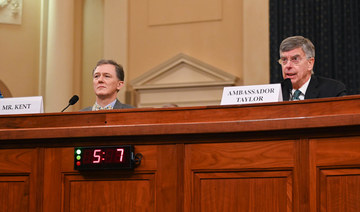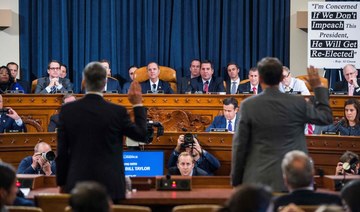WASHINGTON: Gordon Sondland, President Donald Trump’s emissary to the European Union, had a message when he met with a top Ukrainian official.
Sondland said vital US military assistance to Ukraine might be freed up if the country’s top prosecutor “would go to the mike and announce that he was opening the Burisma investigation,” a US official told lawmakers. Burisma is the gas company in Ukraine where Democrat Joe Biden’s son Hunter served on the board.
Sondland relayed the exchange moments later to Tim Morrison, then a National Security Council aide. In his private testimony to impeachment investigators made public Saturday, Morrison recounted that Sondland also told him he was discussing the Ukraine matters directly with Trump.
Morrison’s testimony ties Trump more closely to the central charge from Democrats pursuing impeachment: that Trump held up US military aid to Ukraine in exchange for investigations into Democrats and Biden’s family. Morrison’s testimony also contradicts much of what Sondland told congressional investigators during his own closed-door deposition, which the ambassador later amended.
Both Morrison and Sondland are scheduled to testify publicly next week as part of the historic, high-stakes impeachment proceedings into the nation’s 45th president. Democrats charge that Trump abused his office for personal political gain, while the president and his allies argue that the process is politically motivated and that nothing in the testimony so far meets the bar for impeachment.
Transcripts from the closed-door testimony from Morrison, a longtime Republican defense hawk in Washington, and Jennifer Williams, a special adviser to Vice President Mike Pence on Russia and Europe, were released Saturday as investigators accelerated and deepened the probe. They provided another window into the alarm within the government over Ukraine pressure.
Immediately after the exchange with Sondland during an international gathering in Warsaw, Morrison called his boss, John Bolton, then Trump’s national security adviser.
“Stay out of it,” Bolton told him, “brief the lawyers.”
For Morrison, Burisma was a catch-all for a “bucket” of investigations — of Democrats and the family of Joe Biden — that he wanted to “stay away from.” They had nothing to do with “the proper policy process that I was involved in on Ukraine,” he testified.
Morrison said Sondland and Trump had spoken approximately five times between July 15 and Sept. 11 — the weeks that $391 million in US assistance was withheld from Ukraine before it was released.
While some, including Trump himself, have begun to question Sondland’s knowledge of events, Morrison told House investigators the ambassador “related to me he was acting — he was discussing these matters with the President.”
Pressed by Rep. Adam Schiff, the Democratic chairman of the Intelligence Committee leading the probe, as to whether Sondland had actually spoken to the president, Morrison said he had verified it each time.
Pence, so far, has been a more unseen figure in the impeachment inquiry, but testimony from Williams raised fresh questions about what Pence knew about Trump’s actions toward Ukraine.
Pence was also at the Warsaw gathering. For the new government of Ukraine, situated between NATO allies and Russia, the security aid Congress had already approved was a lifeline to the West.
Williams was among the staffers in the White House Situation Room who listened and took notes during Trump’s July 25 call when he asked Ukraine President Volodymyr Zelenskiy for “a favor.” A whistleblower’s complaint about that call helped spark the House impeachment investigation.
Williams testified that Trump’s discussion on the call of specific investigations struck her as “unusual and inappropriate” and seemed to point to “other motivations” for holding up the military aid.
After the call, Williams told investigators, she put the White House’s rough transcript into the into the vice president’s daily briefing book.
“I just don’t know if he read it,” she said.
Williams corroborated the testimony of a previous witness, Lt. Col. Alexander Vindman, an NSC aide on the call, who said the White House dropped the word “Burisma” from the transcript. She said in an addendum to her testimony that Zelenskiy had mentioned the word “Burisma” in the call.
Vindman and Williams at scheduled to testify together during a public impeachment hearing on Tuesday morning.
The White House’s decision to put the transcript of the July 25 call on a highly classified server has drawn keen interest throughout the probe. But Morrison said the unusual move was unintentional.
Morrison said he was concerned if the call got out it would be politically damaging. He talked to White House lawyer John Eisenberg and they agreed that access should be restricted, he testified.
But Morrison said Eisenberg later told him that he did not intend for the call summary to be placed on a highly classified server. Eisenberg’s staff apparently put it there by mistake, he said.
As the transcripts were released, impeachment investigators wrapped up a rare Saturday session interviewing Mark Sandy, a little-known career official at the Office of Management and Budget who was involved in key meetings about the aid package.
Sandy’s name had barely come up in previous testimony. But it did on one particular date: July 25, the day of Trump’s call with Zelenskiy. That day, a legal document with Sandy’s signature directed a freeze of the security funds to Ukraine, according to testimony.
Throughout Morrison’s account, he largely confirmed testimony from current and former officials about what has been described as a shadow diplomacy being run by Trump’s personal lawyer, Rudy Giuliani, often at odds with US national security interests.
A few days after the Warsaw meeting, Sondland was on the phone telling Morrison Sept. 7 he had just gotten off a call with the president.
Morrison said Sondland related that Trump assured him there were no strings being attached to the military aid for Ukraine.
“The president told him there was no quid pro quo, but President Zelenskiy must announce the opening of the investigations and he should want to do it,” Morrison testified.
Morrison had what he called a “sinking feeling” that the aid may not ultimately be released. About that time, three congressional committees said they were launching inquiries into efforts by Trump and Giuliani to investigate the Bidens.
At a Sept. 11 meeting at the White House, Pence and GOP Sen. Rob Portman of Ohio “convinced the president that the aid should be disbursed immediately,” said Morrison, who said he was briefed about the meeting but did not attend it. “The case was made to the president that it was the appropriate and prudent thing to do.”
Testimony of former National Security Council aide ties Trump closer to pressure on Ukraine
Testimony of former National Security Council aide ties Trump closer to pressure on Ukraine
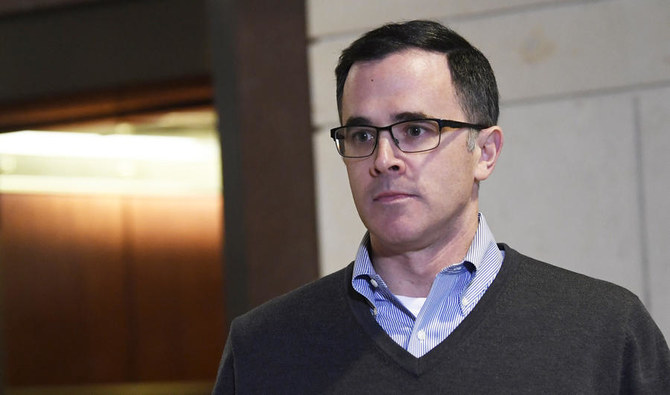
- Former National Security Council aide Tim Morrison recounts that Sondland told him he was discussing the Ukraine matters directly with Trump
Somalia detains US-trained commandos over theft of rations
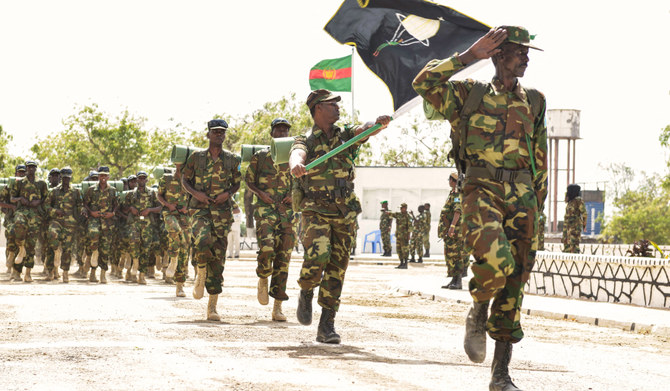
- The US agreed in 2017 to help train and equip the 3,000-strong Danab to act as a quick-reaction strike force against Al-Shabab
MOGADISHU: Somalia’s government said it had suspended and detained several members of an elite, US-trained commando unit for stealing rations donated by the US, adding that it was taking over responsibility for provisioning the force.
The Danab unit has been a key pillar of US-backed efforts to combat the Al-Qaeda-linked militant group Al-Shabab. The US agreed in February to spend more than $100 million to build up to five military bases for Danab.
Somalia’s Defense Ministry said in a statement that it had notified international partners of the theft and would share the outcome of its investigation.
A US official said in a statement to Reuters that Washington takes all corruption accusations seriously.
“We look forward to engaging with the Danab on creating the necessary safeguards and accountability measures to prevent future incidents that could affect future assistance,” the official said, without directly addressing whether any US support had already been suspended.
The US agreed in 2017 to help train and equip the 3,000-strong Danab to act as a quick-reaction strike force against Al-Shabab.
The group has been waging an insurgency against the central government since 2006.
Danab has been heavily involved in a military offensive by the Somali military and allied clan militias since 2022 that initially succeeded in wresting swaths of territory from Al-Shabab in central Somalia.
However, the campaign has lost momentum, with the government-allied forces struggling to hold rural areas and Al-Shabab continuing to stage large-scale attacks, including in the capital Mogadishu.
Washington suspended some defense assistance to Somalia in 2017 after the military could not account for food and fuel.
The US also conducts frequent drone strikes targeting Al-Shabab militants.
Kenya flood death toll since March climbs to 70

- Tanzania Prime Minister Kassim Majaliwa said on Thursday that more than 200,000 people had been affected by the disaster, with 155 fatalities and 236 people injured
NAIROBI: The number of people killed in floods in Kenya due to heavier than usual rainfall since the start of the monsoon in March has risen to 70, a government spokesperson said on Friday.
In recent weeks, Kenya and other countries in East Africa — a region highly vulnerable to climate change — have been pounded by heavier-than-usual rainfall compounded by the El Nino weather pattern.
El Nino is a naturally occurring climate pattern typically associated with increased heat worldwide, leading to drought in some parts of the world and heavy rains elsewhere.
BACKGROUND
Kenyans have been warned to stay on alert, with the forecast for more heavy rains across the country in the coming days as the monsoon batters East Africa.
“The official tally of fellow Kenyans who regrettably have lost their lives due to the flooding situation now stands at 70 lives,” government spokesperson Isaac Mwaura said on X after torrential rains killed more than a dozen people in the capital, Nairobi, this week.
Mwaura said the government would issue a “comprehensive brief” following a meeting with the national emergency response committee after the extreme weather caused chaos across Nairobi this week, blocking roads and engulfing homes in slum districts. Kenyans have been warned to stay on alert, with the forecast for more heavy rains across the country in the coming days as the monsoon batters East Africa.
At least 155 people have died in neighboring Tanzania due to flooding and landslides.
Tanzania Prime Minister Kassim Majaliwa said on Thursday that more than 200,000 people had been affected by the disaster, with 155 fatalities and 236 people injured.
He said homes, property, crops, and infrastructure such as roads, bridges, railways, and schools had been damaged or destroyed.
In Burundi, one of the poorest countries on the planet, around 96,000 people have been displaced by months of relentless rains, the United Nations and the government said this month.
Meanwhile, the UN humanitarian response agency, OCHA, said in an update this week that in Somalia, the seasonal Gu rains from April to June are intensifying, with flash floods reported since April 19.
It said four people had been reportedly killed and more than 800 people affected or displaced nationwide.
Uganda has also suffered heavy storms that have caused riverbanks to burst, with two fatalities confirmed and several hundred villagers displaced.
Late last year, more than 300 people died in torrential rains and floods in Kenya, Somalia, and Ethiopia, just as the region was trying to recover from its worst drought in four decades that left millions of people hungry.
From October 1997 to January 1998, massive flooding caused more than 6,000 deaths in five countries in the region.
Jewish campaign group led by Gideon Falter cancels London march over safety concerns

- The Campaign Against Antisemitism says safety concerns forced it to call off its “Walk Together” march after receiving threats from ‘hostile actors’
- Last weekend, a video appeared to show police prevent ‘openly Jewish’ Falter from walking near a pro-Palestine protest but a longer version of the footage painted a different picture
LONDON: The organizers of a march in protest against antisemitism, planned for Saturday in London, “reluctantly” announced on Friday that they were canceling the demonstration.
The Campaign Against Antisemitism said it was forced by safety concerns to call off its “Walk Together” march, which was scheduled to coincide with the latest in a series of pro-Palestine marches in the British capital. The organization said it had expected thousands of people to take part but threats from “hostile actors” posed a safety risk.
“We have received numerous threats and our monitoring has identified hostile actors who seem to have intended to come to any meeting locations that we announced,” the CAA said.
“The risk to the safety of those who wished to walk openly as Jews in London tomorrow as part of this initiative has therefore become too great.
“We are no less angry about these marches than our Jewish community and its allies. We want to walk.”
The group added that it wants the Metropolitan Police not only to “manage marches” but “police” them.
Last weekend, a video that circulated on social media sparked controversy as it showed a confrontation between the CAA’s chief executive, Gideon Falter, and a Metropolitan Police officer who appeared to be preventing him from crossing the road in the vicinity of a pro-Palestine march in London because he was “openly Jewish” and his presence was “antagonizing.”
Falter, who was threatened with arrest if he did not leave the area, criticized the police for their actions during the incident and claimed there were now “no-go zones for Jews” in London amid a rise in antisemitic sentiment arising from Israel’s war on Gaza following the Oct. 7 attacks by Hamas.
Police chiefs apologized twice for the officer’s choice of words. However, a former senior police officer said on Monday that the initial, short version of the video most people saw online “did not fully represent the situation.”
A longer version showed the officer expressing concern about Falter’s actions because he appeared to be deliberately attempting to provoke the pro-Palestinian demonstrators.
Berlin police clear pro-Palestinian camp from parliament lawn

- Police dismantled tents, forcibly removed protesters and blocked the surrounding area to stop others arriving
- "The idea was to draw attention to that and ... to the German complicity and active enabling of the Israeli genocide in Gaza," the camp organizer, Jara Nassar, said
BERLIN: Berlin police on Friday began clearing a pro-Palestinian camp set up in front of the German parliament by activists demanding the government stop arms exports to Israel and end what they say is the criminalization of the Palestinian solidarity movement.
Police dismantled tents, forcibly removed protesters and blocked the surrounding area to stop others arriving.
The action followed clashes between demonstrators and police on US campuses and a blockade at Paris’s Sciences Po university, part of international protests to decry Israel’s military campaign in Gaza and Western support for Israel.
The Berlin camp ‘Besetzung Gegen Besatzung’ — ‘Occupy Against Occupation’ — began on April 8, coinciding with the start of International Court of Justice hearings in Nicaragua’s case against Germany for providing military aid to Israel.
“The idea was to draw attention to that and ... to the German complicity and active enabling of the Israeli genocide in Gaza,” the camp organizer, Jara Nassar, told Reuters.
Israel strongly denies accusations that its offensive in Gaza, which aims to destroy the Palestinian militant group Hamas, constitutes a genocide.
Nassar and a dozen protesters sat on the ground, chanting pro-Palestinian slogans and songs as police with loudspeakers called on them to leave.
“We look at what is happening in the US ... with admiration. There is no reason to believe we should stop now,” said Udi Raz, a PhD student at Berlin’s Free University and a member of the Jewish Voice association.
Raz, who wore a Jewish kippah with the Palestinian flag colors and held his phone in a live social media broadcast of the clearance, said Jewish activists had joined the camp and held a candle-lit Passover dinner there this week.
Police said the prohibition order for the camp, which had been granted authorization at the start of the protest, was due to repeated violations committed by some protesters, including the use of unconstitutional symbols and forbidden slogans.
“Protection of gatherings cannot be guaranteed at this point because public safety and order are significantly at risk,” police spokesperson Anja Dierschkesaid said, adding tents had to be moved daily under local regulations to maintain the lawn.
“For the German government, grass matters more than the lives of more than 40,000 innocent people in Gaza murdered by the Israeli military,” Raz said.
Philippine police kill an Abu Sayyaf militant implicated in 15 beheadings and other atrocities
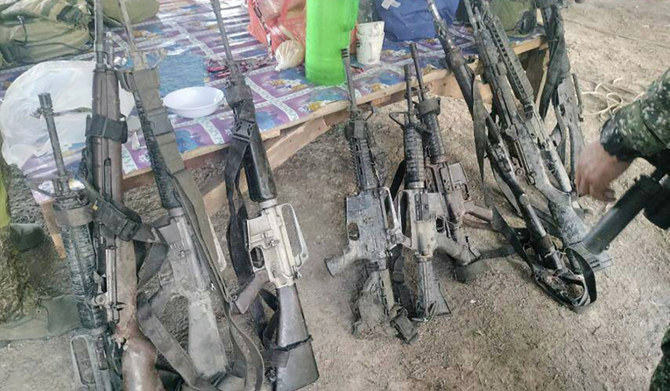
- A confidential police report said that Abdulsaid had been implicated in at least 15 beheadings in Basilan, including of 10 Philippine marines in Al-Barka town in 2007 and two of six kidnapped Vietnamese sailors near Sumisip town in 2016
MANILA: Philippine forces killed an Abu Sayyaf militant, who had been implicated in past beheadings, including of 10 Filipino marines and two kidnapped Vietnamese, in a clash in the south, police officials said Friday.
Philippine police, backed by military intelligence agents, killed Nawapi Abdulsaid in a brief gunbattle Wednesday night in the remote coastal town of Hadji Mohammad Ajul on Basilan island after weeks of surveillance, security officials said.
Abu Sayyaf is a small but violent armed Muslim group, which has been blacklisted by the US and the Philippines as a terrorist organization for ransom kidnappings, beheadings, bombings and other bloody attacks. It has been considerably weakened by battle setbacks, surrenders and infighting, but remains a security threat particularly in the southern Philippines, home to minority Muslims in the predominantly Roman Catholic nation.
Abdulsaid, who used the nom de guerre Khatan, was one of several Abu Sayyaf militants who aligned themselves with the Daesh group.
A confidential police report said that Abdulsaid had been implicated in at least 15 beheadings in Basilan, including of 10 Philippine marines in Al-Barka town in 2007 and two of six kidnapped Vietnamese sailors near Sumisip town in 2016. The Vietnamese were seized from a passing cargo ship.
He was also involved in attacks against government forces in 2022 and a bombing in November that killed two pro-government militiamen and wounded two others in Basilan, the report said.
Abdulsaid was placed under surveillance in February, but police forces couldn’t immediately move to make a arrest because of the “hostile nature” of the area where he was eventually gunned down, according to the report.
On Monday, Philippine troops killed the leader of another Muslim rebel group and 11 of his men blamed for past bombings and extortion in a separate clash in a marshy hinterland in Datu Saudi Ampatuan town in southern Maguindanao del Sur province, the military said.
Seven soldiers were wounded in the clash with the members of the Bangsamoro Islamic Freedom Fighters.
The Abu Sayyaf and the Bangsamoro Islamic Freedom Fighters are among a few small armed groups still struggling to wage a separatist uprising in the southern Philippines.
The largest armed separatist group, the Moro Islamic Liberation Front, signed a 2014 peace pact with the government that eased decades of sporadic fighting.
Moro Islamic Liberation Front rebel commanders became parliamentarians and administrators of a five-province Muslim autonomous region in a transition arrangement after signing the peace deal. They are preparing for a regular election scheduled for next year.



